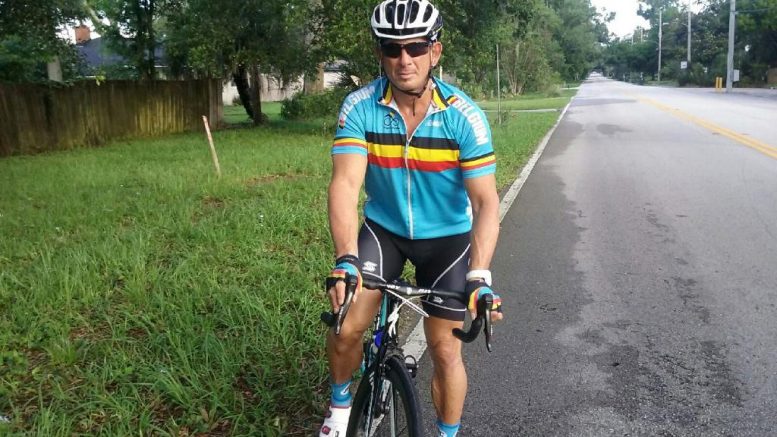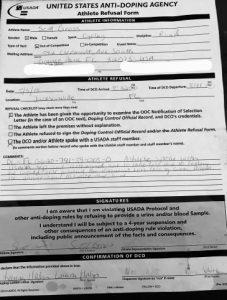When USADA reps showed up at the Florida home of 59-year-old road cyclist Scott Gross at 8:32 p.m. May 3, he refused a drug test. So he drew an automatic 4-year suspension. He didn’t appeal. After posting about Scott’s case a couple weeks ago, I found him through his cycling shop, Open Road Bicycles.
He called me, and we chatted for about a half-hour.
He told me he refused testing, which he assumed would include drawing blood, because he met the USADA pair in his garage and didn’t think it was a suitable place. He also wasn’t sure the reps were up for the job, he told me.
Scott sent me a copy of his refusal form, which included his signature. In comments, USADA Doping Control Officer Laura Hahn wrote: “Athlete spoke with USADA rep and determined not to take test due to feeling he would test positive for vitamins he’s taking with DHEA. He doesn’t want to waste our time.”
Scott also told me he was taking DHEA, an anabolic substance, because he was nearing age 60 and was feeling his mortality. (DHEA often is touted for anti-aging and better-sex properties.)
He knows it’s banned but doesn’t care. He says he competes for fun — and isn’t anywhere near championship caliber. He doesn’t deprive anyone of prize money, he says.
Who fingered him via the Play Clean Tip line (or email)? Scott isn’t sure, but he suspects it’s an old girlfriend. He says USADA had an old address on record but visited his new address — and his ex knew where he was. (USADA paid its own way for the visit.)
He calls himself a passionate cyclist who will continue to ride with his friends. Scott says USADA advised him he could ride in nonsanctioned events (which Lance Armstrong did after his bust).
Scott’s case isn’t the last for a masters cyclist.
On June 1, in fact, USADA announced a two-year sanction for an M50 cyclist in Oklahoma — Buster Brown of Bixby.
From the news release:
Brown, 53, tested positive for the presence of an anabolic agent and/or its metabolites as the result of an out-of-competition urine sample he provided on October 11, 2016. Brown was target tested based on credible information USADA received through the PlayClean Tip Center. His urine sample was analyzed using a specialized test that differentiates between anabolic-androgenic steroids naturally produced by the body and prohibited anabolic agents of external origin. The use of anabolic agents is prohibited at all times under the USADA Protocol for Olympic and Paralympic Movement Testing, the United States Olympic Committee National Anti-Doping Policies, and the International Cycling Union Anti-Doping Rules, all of which have adopted the World Anti-Doping Code and the WADA Prohibited List.
After a thorough review of the case, including the examination of medical records provided by the athlete, USADA determined that Brown’s positive test was caused by a prescribed medication containing testosterone, which he was using in a therapeutic dose under the care of a physician. Although the substance was taken at the direction of a physician, the USADA Therapeutic Use Exemption (TUE) Policy requires athletes to obtain a TUE before using a prohibited substance.
Brown’s two-year period of ineligibility began on November 29, 2016, the date his provisional suspension was imposed. In addition, Brown has been disqualified from all competitive results obtained on and subsequent to August 1, 2015, the approximate first date he began using testosterone, including forfeiture of any medals, points and prizes.
And on we roll.
Contribute to support independent track and field journalism:






It sounds like Scott knew what he was doing and got caught. Refreshing that he admits it rather than making the usual excuses.
Brown also got caught. Did he try to get a TUE or did he just hope no one noticed?
I don’t think that the current system works for masters or elite athletes and should be changed but don’t think that it excuses cheating either.
I’ve been commenting as anonymous because my opinions may not be popular and I don’t want to be accused of supporting the evil axis of doping whatever that may be. I’m done now because we have a case that clearly illustrates how ridiculous the doping drama of masters athletes has become. An ex-girlfriend?? Wonderful. What next? I understand road races where prize money is at stake. They should have rigorous testing. For those who think the usual excuses are trotted out, I call BS. The number of substances banned by USADA causes a large number of our meds and supplements to be traps waiting to snap. It is true that the current system is not working. The road to hell is paved with good intentions.
Tom Sputo should be congratulated for pointing out the deficiencies of the system. It is truly a piece of merde.
I agree that the current system is not working as intended and that it is potentially doing more harm than good for our sport. The system is designed around Olympic caliber athletes with professional coaches and access to a supportive medical team. To apply this to 50 something hobbyists with just a GP for advice is not practical. Our demographic can be roughly split into three groups: 1) the blatant cheats, 2) those blessed with good health and on no medication whatsoever, and 3) those on doctor prescribed age related medications. I would expect 3) to be the largest group by far. That third group is then faced with three choices, A) withdraw from sanctioned events (and hence the highest level of competition), B) try to get a TUE (almost impossible for a 50 something hobbyist), or C) decide the rules are stupid and will compete anyway and if I get caught so be it. I suspect the two cyclist and several posters to this board have come to accept option C.
My feeling is there should be a relaxed set of criteria for masters athletes starting at 50 years old, or whatever. This would make TUEs easier to obtain and make the threshold levels for various standard medications such as blood pressure meds and testosterone supplements higher. I realize this will require a tremendous amount of work by WADA and the agencies and is unlikely to happen.
In the meantime people caught by the system will be judged in the court of public opinion to be either blatant cheats or victims of the system.
An unranked masters cyclist gets four years and a NFL wide receiver gets four GAMES for getting popped for EPO. The NFL is just not getting done in so many levels.
“it” done